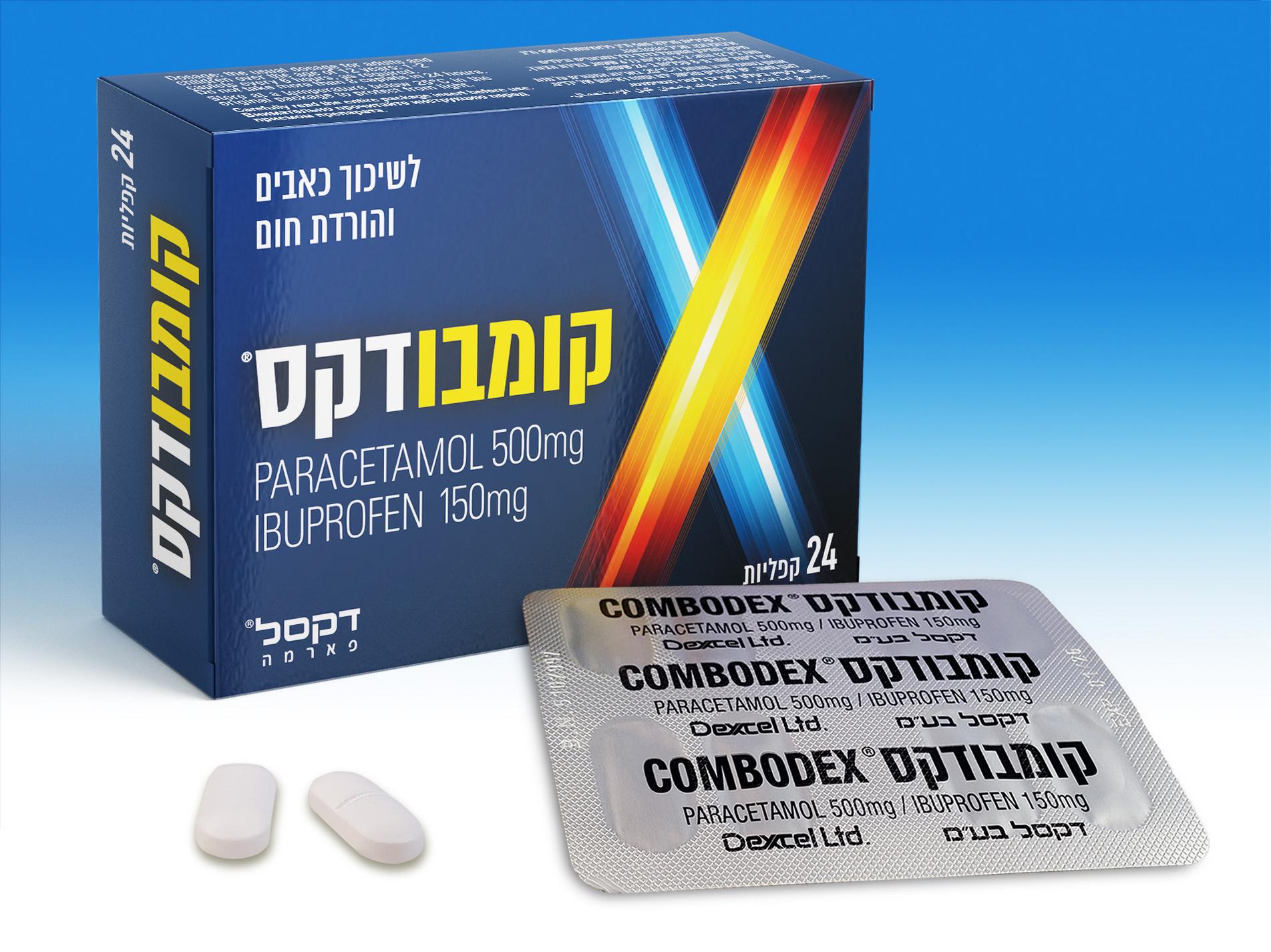Quest for the right Drug

קומבודקס COMBODEX (IBUPROFEN, PARACETAMOL)
תרופה במרשם
תרופה בסל
נרקוטיקה
ציטוטוקסיקה
צורת מתן:
פומי : PER OS
צורת מינון:
קפליות : CAPLETS
עלון לרופא
מינוניםPosology התוויות
Indications תופעות לוואי
Adverse reactions התוויות נגד
Contraindications אינטראקציות
Interactions מינון יתר
Overdose הריון/הנקה
Pregnancy & Lactation אוכלוסיות מיוחדות
Special populations תכונות פרמקולוגיות
Pharmacological properties מידע רוקחי
Pharmaceutical particulars אזהרת שימוש
Special Warning עלון לרופא
Physicians Leaflet
Interactions : אינטראקציות
4.5 Interaction with other medicinal products and other forms of interaction The following interactions of paracetamol with other medicines have been noted: • Anticoagulant drugs (warfarin) - dosage may require reduction if paracetamol and anticoagulants are taken for a prolonged period of time. • paracetamol absorption is increased by substances that increase gastric emptying, e.g. metoclopramide. • paracetamol absorption is decreased by substances that decrease gastric emptying, e.g. propantheline, antidepressants with anticholinergic properties, and narcotic analgesics. • paracetamol may increase chloramphenicol plasma concentrations. • the risk of paracetamol toxicity may be increased in patients receiving other potentially hepatotoxic drugs or drugs that induce liver microsomal enzymes such as alcohol and anticonvulsant agents. • paracetamol excretion may be affected and plasma concentrations altered when given with probenecid. • cholestyramine reduces the absorption of paracetamol if given within 1 hour of paracetamol. • Severe hepatotoxicity at therapeutic doses or moderate overdoses of paracetamol has been reported in patients receiving isoniazid alone or with other drugs for tuberculosis. • Severe hepatotoxicity has occurred after use of paracetamol in a patient taking zidovudine and co- trimoxazole. The following interactions of ibuprofen with other medicines have been noted: • anticoagulants, including warfarin – ibuprofen interferes with the stability of INR and may increase risk of severe bleeding and sometimes fatal haemorrhage, especially from the gastrointestinal tract. Ibuprofen should only be used in patients taking warfarin if absolutely necessary and they must be closely monitored. • Ibuprofen may decrease renal clearance and increase plasma concentration of lithium. • Ibuprofen may reduce the anti-hypertensive effect of ACE inhibitors, beta-blockers and diuretics and may cause natriuresis and hyperkalaemia in patients under these treatments. • Ibuprofen reduces methotrexate clearance. • Ibuprofen may increase plasma levels of cardiac glycosides. • Ibuprofen may increase the risk of gastrointestinal bleeding especially if taken with corticosteroids. • Ibuprofen may prolong bleeding time in patients treated with zidovudine. • Ibuprofen may also interact with probenecid, antidiabetic medicines and phenytoin . • Ibuprofen may also interact with tacrolimus, ciclosporin, sulphonylureas and quinolone antibiotics. • Selective serotonin re-uptake inhibitors (SSRIs) and NSAIDs each entail an increased risk of bleeding, e.g. from the gastrointestinal tract. This risk is increased by combination therapy. The mechanism may possibly be linked to reduced uptake of serotonin in the platelets. • Mifepristone: A decrease of the efficacy of the medicinal product can theoretically occur due to the antiprostaglandin properties of NSAIDs including acetylsalicylic acid. Limited evidence suggests that co-administration of NSAIDs on the day of prostaglandin administration does not adversely influence the effects of mifepristone or the prostaglandin on cervical ripening or uterine contractility and does not reduce the clinical efficacy of medical termination of pregnancy • Caution should be taken when paracetamol is used concomitantly with flucloxacillin as concurrent intake has been associated with high anion gap metabolic acidosis, especially in patients with risks factors (see section 4.4) Acetylsalicylic acid Concomitant administration of ibuprofen and acetylsalicylic acid is not generally recommended because of the potential of increased adverse effects. Experimental data suggest that ibuprofen may competitively inhibit the effect of low dose acetylsalicylic acid on platelet aggregation when they are dosed concomitantly. Although there are uncertainties regarding extrapolation of these data to the clinical situation, the possibility that regular, long-term use of ibuprofen may reduce the cardioprotective effect of low-dose acetylsalicylic acid cannot be excluded. No clinically relevant effect is considered to be likely for occasional ibuprofen use (see section 5.1). This product may interfere with some medicines. These include: • warfarin, a medicine used to prevent blood clots • medicines to treat epilepsy or fits • chloramphenicol, an antibiotic used to treat ear and eye infections • probenecid, a medicine used to treat gout • zidovudine, a medicine used to treat HIV (the virus that causes AIDs) • medicines used to treat tuberculosis such as isoniazid • acetylsalicylic acid, salicylates or other NSAID medicines • medicines to treat high blood pressure or other heart conditions • diuretics, also called fluid tablets • lithium, a medicine used to treat some types of depression • methotrexate, a medicine used to treat arthritis and some types of cancer • corticosteroids, such as prednisone, cortisone The above medicines may be affected by this product or may affect how well this product works.

שימוש לפי פנקס קופ''ח כללית 1994
לא צוין
תאריך הכללה מקורי בסל
לא צוין
הגבלות
לא צוין
מידע נוסף
עלון מידע לצרכן
08.11.21 - עלון לצרכן אנגלית 08.11.21 - עלון לצרכן עברית 08.11.21 - עלון לצרכן ערבית 25.08.23 - עלון לצרכן עברית 13.09.23 - עלון לצרכן אנגלית 13.09.23 - עלון לצרכן עברית 13.09.23 - עלון לצרכן ערבית 21.12.23 - עלון לצרכן עברית 27.12.23 - עלון לצרכן עברית 18.07.24 - עלון לצרכן אנגלית 18.07.24 - עלון לצרכן עברית 18.07.24 - עלון לצרכן ערבית 05.09.18 - החמרה לעלון 08.12.20 - החמרה לעלון 19.07.21 - החמרה לעלון 25.08.23 - החמרה לעלון 21.12.23 - החמרה לעלוןלתרופה במאגר משרד הבריאות
קומבודקס